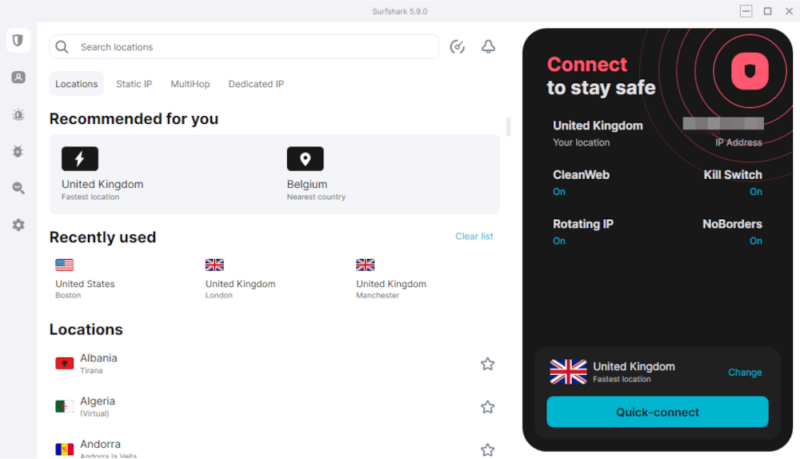Internet Censorship in China: How the Middle Kingdom Blocks the Web Explained in 2025
China is notorious for censoring the internet and blocking websites that allow free speech. This article delves into the history of censorship in China, the underlying reasons and specific censorship laws. We also explain how you can bypass restrictions.
The People’s Republic of China is one of the worst places for internet censorship. The communist government keeps a tight rein on internet activities, blocking many foreign websites and forbidding the mention of sensitive topics. Over the last four decades, censorship in China has been reinforced by laws with severe penalties.
The Chinese government censors the internet to preserve its political control by limiting the spread of information that could threaten its rule. In addition, the government wants to prevent ideologies that challenge its version of Chinese culture and identity.
National security is another commonly cited reason for China’s strict censorship measures. Freedom House, an organization that ranks countries based on internet freedom ranks the country as “not free,” with a score of nine out of 100.4
In this article, we’ll dig deep into Chinese internet censorship, exploring its history, implementation and the laws backing it. We’ll also show you how to defy China’s online censorship and browse in the Middle Kingdom without looking over your shoulder, as well as name the best VPN services for China.
-
11/20/2024 Facts checked
We’ve rewritten the article with a deeper dive into internet censorship in China and more sections focused on answering questions.
History of Censorship in China
China allowed its citizens to access the internet in the mid-1990s, seeing it as a tool for globalization. However, the government soon grew concerned about citizens accessing outside information and protestors using the internet as a rallying point.5
In one illustrative case in the late 1990s, a religious sect known as Falun Gong used emails to set up a mammoth protest.6 Over 10,000 practitioners gathered around the communist party’s offices to demand an end to their harassment. This was the largest protest since the Tiananmen Square demonstrations of 1989.
In 1998, Chinese authorities implemented the Golden Shield project, a massive online content filtering system designed to regulate internet users. In the last three decades, the government has tightened its reins over the internet with more rules and systems. Here are some notable highlights:
- 2000: China introduces the State Council Order No. 292 and the “Internet Regulations” to track and control internet companies and internet service providers.7
- 2003: China intensifies censorship by blocking internet content providers that criticized its handling of the SARS outbreak.8
- 2008: The government increases censorship to control the narrative around the Beijing Olympics.9
- 2010: The Golden Shield Project becomes fully operational.10
- 2017: China enacts the Cybersecurity Law, which regulates how organizations store and transfer data.11
- 2022: In the wake of the COVID-19 outbreak, the government increases censorship activities to control information about the virus and vaccines.12
The Chinese government has shown no signs of slowing down, even in 2024. It now requires real-name registrations for many platforms. The government is also enforcing its censorship laws, especially for the news media, online gaming, education, the environment and health services.
The Great Firewall of China
The Golden Shield Project, nicknamed the Great Firewall of China, is an extensive system that China uses to control internet traffic. The Firewall has two main purposes: to restrict content that the government deems inappropriate or harmful and to let authorities monitor the online activities of Chinese internet companies and Chinese citizens.
The Firewall was initiated in the early 2000s with basic content-filtering capabilities. Over the years, Chinese authorities have added advanced filtering techniques, including algorithmic censorship, deep packet inspection (DPI) and real-time monitoring.13 The government has also introduced technology that seeks to detect encrypted traffic.14
China is secretive about the number of people employed to work on the Firewall. In 2013, the Beijing News reported that more than 2 million people were working to censor the internet.15 Their work includes flagging keyword mentions, especially on social media sites. By now, China likely has millions more employees policing the internet.
Internet Censorship: Where Does Filtering Occur?
China’s Great Firewall filters content virtually everywhere on the internet, including websites, apps, ISPs and search engines. Here’s a summary of all the levels where the filtering occurs:
- Websites and IP addresses: The Firewall blocks many popular news and social media sites, including Wikipedia, BBC, Gmail, Instagram and Quora.
- Internet service providers (ISPs): China requires ISPs to monitor and block forbidden content. ISPs can face penalties if they don’t comply.
- Search engines: Search engines like Baidu must filter search results and avoid banned keywords.
- Domain Name System (DNS): When you ask your browser to open a website, your request is sent to a DNS server to match the URL to a destination. In a process known as DNS poisoning, the Great Firewall enters the wrong information for certain DNS requests, making them unresolvable.
- Apps: China has blocked many social media apps, censorship circumvention tools like VPNs, and other objectionable apps.
- Public institutions: China’s Great Firewall monitors and censors all public institutions, including schools, corporations, media organizations and businesses.
Does China’s Censorship Affect Hong Kong and Macau?
China doesn’t implement the same level of censorship in Hong Kong and Macau as it does with users in mainland China. Hong Kong and Macau have been special administrative regions (SARs) of China since 1997 and 1999, respectively. However, they allegedly function under the “one country, two systems” principle.
Hong Kong and Macau are supposed to handle all matters themselves, except those relating to diplomacy and national defense. As a result, China’s Great Firewall doesn’t operate in those jurisdictions. You should be able to access the internet regularly and enjoy popular websites like Facebook, YouTube and Instagram without hiccups.
However, there’s still some level of censorship in these regions. For instance, Hong Kong introduced the National Security Law in 2020, allowing authorities to order the removal of online content. The Human Rights Watch also reported that academics in Hong Kong are facing censorship and growing restrictions on their rights.
Why Does China Censor the Internet?
China censors the internet to control the information available to its citizens. Through the Central Propaganda Department, the Chinese Communist Party has systems and rules that enforce censorship in the Chinese internet industry. Let’s break down some of the reasons China censors the internet:
- Political control: The Chinese Communist Party (CCP) uses censorship to spread its ideologies and control the narrative. The party censors conversations about human rights, democracy, and any criticism of its activities and policies.
- Social stability: The Chinese government believes that the free flow of information can lead to dissent, protests and activities that will disturb social order. It monitors the internet to flag any groups or discussions that don’t agree with the dictates of the CCP.
- Economic reasons: Blocking “foreign” websites and apps enables the country to promote the growth of local companies, especially Chinese tech companies. For instance, China’s blockage of Google’s search engine has allowed Baidu, a Chinese search engine, to obtain the largest market share in the country.
- National security: Chinese authorities censor the internet to prevent foreign influences that could potentially swing public perception, indoctrinate citizens and compromise Chinese data.
- Preservation of culture: China uses the internet to promote content that is considered to align with traditional Chinese values and norms. The government censors any information that it deems unwholesome or immoral.
The Pros and Cons of Internet Censorship in China
China claims that its internet censorship is beneficial for national security. It allows the government to control the spread of false news that can incite chaos and violence. Censorship also helps the Chinese government protect cultural values and norms from unwanted foreign influences.
However, China’s censorship has many disadvantages. Censorship defies freedom of speech and undermines the rights of citizens to access information and express themselves. Totalitarian governments employ censorship almost universally so they can impose their wills on the people without transparency or accountability.
Furthermore, censorship creates an echo chamber where individuals are not exposed to new information and ideas. This can stifle creativity and innovation. Even worse, it can create polarized citizens who struggle to consider other viewpoints and perspectives.
Examples of China Censorship Laws: Internet Restrictions
Since the early 2000s, China has enacted laws to regulate how people in the country access and use the internet. Below are some of the key moments in its legal campaign:
- Regulations on the Management of Internet Information Services (2000): This law requires internet information services to obtain a license before operating.16
- Measures for the Administration of Internet News Information Services (2005): This regulation asks online news platforms to obtain licenses, adhere to the country’s guidelines, avoid sensitive topics and cooperate with law enforcement.17
- Audiovisual Product Import Management Rules: This law lets the government control the licensing and content of audio-visual services.18
- The Cybersecurity Law (2017): This law adds stipulations for managing cybersecurity in China. It covers network security, data localization, incident response and government oversight.19
- The Data Law (2021): In this law, the Chinese government focuses on regulating data management and conducting security assessments to ensure compliance.20
- Personal Information Protection Law (PIPL) (2021): This law provides guidelines for collecting, storing, processing and sharing the data of Chinese netizens.21
- Translation: Outbound Data Transfer Security Assessment Measures (2021): Published by the Cyberspace Administration of China (CAC), this law provides guidelines for the transfer of Chinese user data across different countries.22
- State Secrets Law (2024): This law was originally enacted in the late 90s. China continues to update it with tighter restrictions on sharing classified information and stricter punishments.23
Defying Online Censorship in China
A VPN is the safest and most effective way to bypass censorship in China. Short for virtual private network, a VPN can change your online location to make it seem like you’re in a different country, thereby evading Chinese blocking systems.
It’s similar to using a VPN to unblock Netflix at school. However, please note that not all VPNs work in China. The Great Firewall can identify and block some VPN IP addresses.
There are other ways to defy censorship in China, such as using a smart DNS, proxies or the Tor browser. However, Chinese servers can detect and block these methods more easily. In addition, some don’t encrypt your internet connection, which could leave your location and internet activity exposed.
Which VPNs Work in China?
Surfshark is the best VPN to use in China thanks to its vast server network, and excellent security and privacy features. We also think it’s one of the best VPNs overall. Surfshark lets you connect to over 3,200 servers in 100 countries, including Macau. It also has servers in Taiwan and Hong Kong, which are close to China and tend to offer faster speeds.

and its VPN servers work well in China.
Surfshark offers obfuscation, which hides the fact that you’re using a VPN from Chinese servers. In addition, you can route your traffic through two servers using its MultiHop feature, making it even harder to trace your internet activity. Surfshark also lets you use one subscription on unlimited devices, as you can read in our Surfshark review.
Other VPN providers worth considering are Astrill VPN and CyberGhost. Astrill is a reliable VPN service for China with obfuscated servers and excellent streaming abilities. However, it’s very expensive. CyberGhost is another useful option that can also give you a Chinese IP address while you’re traveling outside mainland China. This is also good for unblocking Chinese sites like Youku.
Tips for Using a VPN in China
Take note of the following when using a VPN in China:
- Download a VPN before heading to China: China has blocked most VPN apps and websites, so you’ll need to install a VPN before visiting the country.
- Bring multiple VPNs to China: We recommend downloading and installing multiple VPNs before entering China. That way, you’ll have a fallback option if one VPN fails.
- Consider the manual download and setup: If you’re already in China and can’t download a VPN app, you may be able to get a manual setup configuration by emailing the VPN provider directly.
- Activate obfuscation: Some VPNs like ExpressVPN offer obfuscation on all servers, while others provide it on specific protocols. For example, Surfshark automatically applies obfuscation to all OpenVPN connections.
Final Thoughts
If you attempt to browse the internet in China, you’ll notice that many popular websites and social media platforms don’t open. This is because China maintains a tight grip on internet activities to control the information its citizens can access. It also uses the internet to monitor its people and penalize contrary views and opinions.
In the last 40 years, China has enacted many laws and regulations to support its bid to control the internet. If you want to access the internet freely, we recommend using a VPN service to change your virtual location and encrypt your traffic. Surfshark is the best VPN for China due to its large server network, reliable unblocking ability and excellent security.
Have you ever traveled to China? Did you have difficulties accessing any websites? How did you get around Chinese geoblocks? Has this article answered your questions about browsing in China, or do you have more questions and insights? Share your thoughts and opinions with us in the comments section below.
FAQ: Media Censorship in China
China has blocked all sorts of websites and popular social media platforms, including Facebook, YouTube, Instagram and Twitter. The state has also blocked foreign news outlets and censored Chinese media.
China has blocked a wide range of content, including news from foreign media outlets, political content that criticizes the government, and activism that paints the government in a bad light.
China operates a totalitarian government that restricts freedom of speech among its citizens and residents. For example, the nation prohibits search terms related to “Tiananmen Square” to control the narrative and avoid further protests.
China censors nudity and sexual scenes, LGBTQ scenes and unsanctioned religious practices. It also censors references to historical events such as the Tiananmen Square protests and anything that criticizes the government.
Sources:
- China Freedom on the Net 2021 – Freedom House
- How China has censored words relating to the Tiananmen Square anniversary – The World
- China’s ‘MeToo’ movement evades censors with #RiceBunny – CNBC
- China Country Profile – Freedom House
- China’s Secret to Controlling the Internet – Foreign Policy
- Why China Fears the Falun Gong – Los Angeles Daily News
- Internet Information Service Management Measures – Stanford University
- China Handled COVID-19 Better Than It Did SARS, but the Bar Is Low – AEI
- China: Censorship Mars Beijing Olympics – Human Rights Watch
- Timeline: China’s Net Censorship – BBC
- Overview of China’s Cybersecurity Law – KPMG
- Chinese social media censoring ‘officially sanctioned facts’ on coronavirus – The Guardian
- Free speech vs Maintaining Social Cohesion – Stanford
- How the Great Firewall of China Detects and Blocks Fully Encrypted Traffic – Great Firewall Report
- China ‘employs 2 million to police internet’ – CNN
- Internet Information Service Management Measures – DigiChina
- Regulations on Internet Security Protection Technology Measures – DigiChina
- Audiovisual Product Import Management Rules – DigiChina
- Translation: Cybersecurity Law of the People’s Republic of China – DigiChina
- Translation: Data Security Law of the People’s Republic of China – DigiChina
- Translation: Personal Information Protection Law of the People’s Republic of China – DigiChina
- Translation: Outbound Data Transfer Security Assessment Measures – DigiChina
- PRC Law on the Protection of State Secrets – China Law Translate


